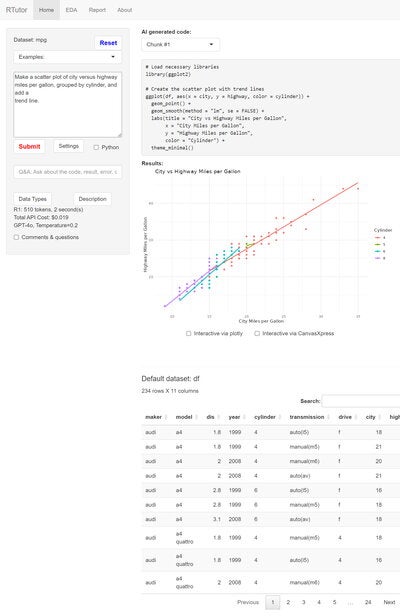
Professor Vimal Rao of the University of Illinois Urbana-Champaign's Department of Statistics is a recipient of an Illinois Center for Social & Behavioral Science (CSBS) Small Grant award for his innovative project to transform data science accessibility. The grant will fund Rao's work to explore how artificial intelligence tools such as Rtutor.AI can be used to make data science education more accessible while overcoming barriers such as learning complex coding languages. This project is particularly beneficial in introductory statistics courses where the primary goal is to develop a conceptual understanding of data science rather than a mastery of a programming language.
Developed by Dr. Xijin Ge of South Dakota State University and released in late 2022, Rtutor.AI is an AI-powered tool that combines the capabilities of Open AI's ChatGPT with the R programming language. The program allows users to upload a dataset and enter simple text prompts on the desired output. The tool then generates complex data visualizations without requiring the user to write intricate R or Python code. Additionally, the program displays the R code that must otherwise be meticulously entered into R to generate similar visualizations. This powerful tool has the potential to make statistical analysis more accessible, which is what Rao hopes to accomplish with this project. "When I found Rtutor.AI on Twitter," Rao recalls, "and I immediately thought about its pedagogical impact."
Rao spent some time with the tool to test its functionality before incorporating it into his workflow. "I use it myself when writing new code or trying to do something specific, like adjusting the legend position in a graph," he said. "I just go there, and it gives me the base code. Then, I can modify it as needed." While using the program, Rao recognized the broader potential of Rtutor.AI in the classroom, especially for his introductory STAT 100 course. "In my view, STAT 100 is not just a stats course; it's about quantitative reasoning. Statistics are everywhere, but to truly understand them, you need more than just a conceptual understanding—you must also know how to produce statistical work."
Procedural fluency to develop conceptual understanding is the basis of the project. With Rtutor.AI, Rao envisions a new way of teaching that aligns more closely with the needs of modern students. "According to the recommendations put out by the American Statistical Association, we want students to be statistically literate, able to interpret complex graphs and visualizations that show multiple variables at a time," Rao said. Typically, introductory statistics courses do not cover multivariable statistics; however, with technology like Rtutor.AI, students can get hands-on experience with complex data without learning complex coding languages. While this benefits statistics majors who may just be beginning their academic journey, this will be a game changer for the over 3,000 Illinois students who enroll in STAT 100 annually to complete their quantitative reasoning requirements.

Rao's developing curriculum incorporating Rtutor.AI aims to provide students with everyday case use and an experience they will carry with them beyond the classroom. Although Rao does not expect students to remember specific algorithms, he hopes they will recall practical and engaging aspects of the class. One of the key highlights from his recent pilot project was the use of association rule mining - a technique similar to those employed by Netflix and Spotify for recommendations - to provide students with a practical, real-world example of how to apply this technology in everyday life. "Last semester, I had students list movies from different genres to collect data," Rao recounts. "We then used our data to generate recommendations, all within 50 minutes, without learning complex code."
This approach will particularly benefit students enrolled in the forthcoming Bachelor of Liberal Studies program through the College of Liberal Arts & Sciences. The BLS program is intended to accommodate students from all walks of life, including historically marginalized students, non-traditional adult learners, and returning students who may not have completed prior degree programs. For Rao, this is an opportunity to reformulate the STAT 100 curriculum to be inclusive not only for Illinois first-time freshmen but also for all students coming to Illinois to meet their education goals. Rao's approach provides immediate value for future BLS students, who often bring practical experience to their studies. "The focus needs to be very practice-orientated, showing how this stuff applies to what they're doing in their jobs," Rao explains. "With Rtutor.AI, adult learners do not need any specialized software to get started. They can upload their own data and we can dive into their specific context to discuss what the data means and how to apply it."
Using technology that allows learners to interact with their data, Rao aims to generate a more meaningful experience. "My goal is for students to (1) remember they took a stats class, (2) have a generally positive memory of it, and (3) connect that memory to something they encounter throughout their lives," Rao notes.
While the concept of putting such a strong emphasis on AI use in the classroom may seem counterintuitive to the overall learning goal, Rao notes there are nuanced processes the students will need to follow to achieve their desired outcomes. Regarding the language and computational grammar intended for input into Rtutor.AI, it is not simple plug-and-play. Rao wants to focus on having students develop new skills such as prompt engineering, computational thinking, and cognitive competence to achieve the desired learning outcomes his new curriculum focuses on.
The new STAT 100 curriculum, set to be finalized within a year, will be available as open source. It will offer a comprehensive set of resources designed to move beyond traditional methods of teaching statistics. Other institutions can utilize this in their curriculum to enhance the overall experience of their introductory statistics courses.
The CSBS Small Grant award provides an opportunity for Rao and his co-PI, Dr. Xijin Ge, creator of Rtutor.AI, to explore this innovative method that could fundamentally change how introductory statistics is taught. Amid the challenges of the digital revolution that the CSBS award looks to address, Rao's project stands out by identifying emerging technologies and harnessing them to develop innovative methodological tools that assess the potential impacts of these advances and optimize them for societal benefit.
While Rtutor.AI was not initially created as an educational tool, Rao and Ge hope to expand the tool’s potential to make data science accessible to not only Illinois students but all students. Rao's ambition extends beyond simply updating the curriculum; it involves a fundamental overhaul of teaching methods and the role of technology in the classroom. "This project is all about radically rethinking how introductory statistics is taught," Rao explains. "That's the core of what drives most of my research."
Rao's innovative project, supported by the Illinois Center for Social & Behavioral Science Small Grant, is reimagining how introductory statistics can be taught in a more inclusive and accessible way for students of all backgrounds. By integrating Rtutor.AI into his curriculum, Rao aims to bridge the gap between theoretical understanding and practical application, empowering students to explore statistical concepts without being hindered by coding challenges. As his curriculum evolves, Rao's innovative approach has the potential to open doors for students of all backgrounds and skill levels to engage with data in meaningful, transformative ways.